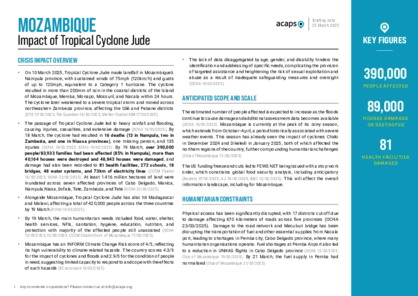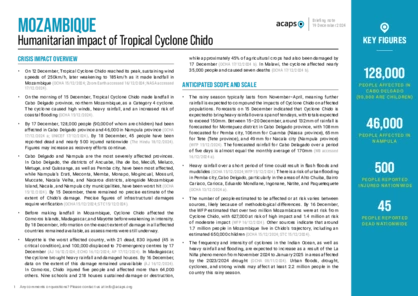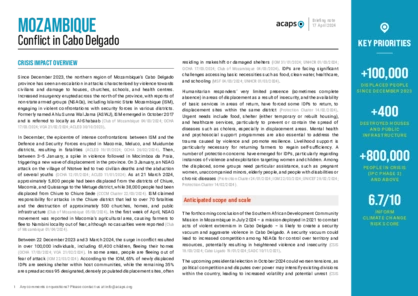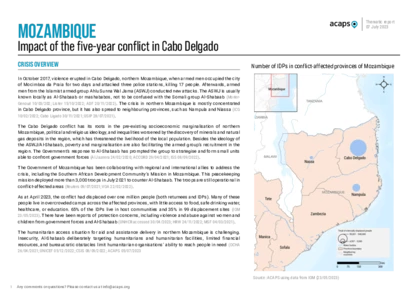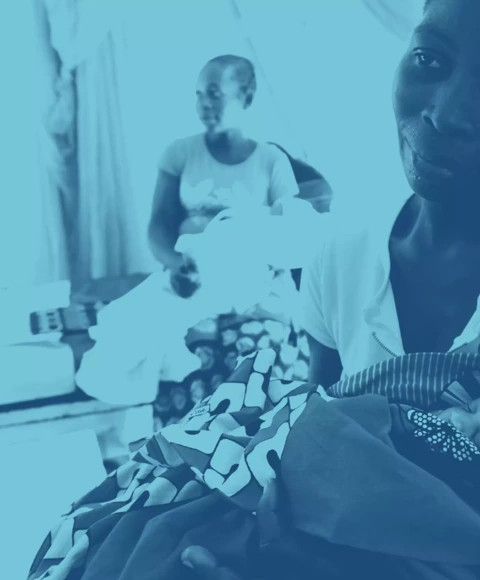Latest updates on country situation
11 March 2025
On 10 March 2025, Tropical Cyclone Jude made landfall in Mossuril district, Nampula province, with strong winds and heavy rainfall. It caused widespread destruction, leaving many people homeless, without power, and with limited access to services given damaged infrastructure. Preliminary assessments are underway. Approximately 780,000 people are at risk from the strong winds and heavy rains expected from the cyclone, particularly in Nampula and Zambezia. The current rainy season and cyclone season may lead to a rise in cholera cases in these two provinces. Jude is the third cyclone to hit Mozambique since December 2024, adding to the complexities of the humanitarian response in the affected regions. The impact of the two cyclones is placing a significant strain on response efforts, aggravated by conflict, political tensions, and a decline in humanitarian funding. Those affected by the cyclone will likely require shelter, food and NFIs, health services, and protection. (OCHA 10/03/2025, MISAU 11/03/2025, AimNews 11/03/2025)
21 January 2025
Tropical Cyclone Dikeledi made landfall in Mozambique on 13 January 2025 and affected more than 234,000 people, with almost 20,000 homes destroyed. The cyclone destroyed infrastructure, including houses, health facilities, schools, and roads. It hit Nampula province the hardest, displacing more than 2,300 people. Many of those displaced are living in makeshift tents or overcrowded conditions. Their immediate needs include shelter, NFIs, WASH intervention, food, and healthcare. (Club of Mozambique 21/01/2025, IOM 21/01/2025, ECHO 20/01/2025)
20 January 2025
The combined effects of Cyclones Chido and Dikeledi in northern Mozambique during the 2024/2025 cyclone season are expected to worsen food insecurity in provinces already impacted by conflict. Between October 2024 and March 2025, approximately 1.98 million people are projected to face acute food insecurity (IPC Phase 3 or higher), including 212,000 in IPC Phase 4 (Emergency) and 1.7 million in IPC Phase 3 (Crisis). This represents a 33% increase from the August–September 2024 period, when 1.49 million people were classified in IPC Phase 3 or higher.
Factors contributing to this increase include drought induced by El Niño during the 2023/2024 rainy season, Tropical Storm Filipo, conflict and insecurity, and high food prices. The recent cyclones have further worsened the crisis, with Cyclone Chido destroying 62% of farmland in the affected areas. Disruptions to transportation and agriculture will likely intensify food insecurity, particularly in conflict-affected northern provinces, where livelihoods and access to essential resources are already compromised.
17 December 2024
On 15 December 2024, Tropical Cyclone Chido struck Mecufi district in Cabo Delgado province. Until 17 December, it affected over 174,000 people, killing at least 34 and injuring 319. The cyclone destroyed or damaged 35,000 homes and affected nine schools and ten health facilities across Chiure, Mecufi, and Pemba. Impacts have also been reported in the regions of Macomia, Metuge, Montepuez, Muidumbe, and Namuno. (OCHA 17/12/2024, OCHA 16/12/2024)
17 December 2024
Tropical Cyclone Chido caused significant disruption in the Comoros, Malawi, Mayotte and Mozambique. In Mozambique, it made landfall on 15 December 2024 in Cabo Delgado province, killing at least 45, injuring 493, and affecting over 184,000 people. It damaged approximately 35,000 houses, 149 schools, and 48 health facilities, mostly in Chiure, Mecufi, and Pemba, which are facing utility outages and urgent protection needs. In Malawi, it had affected over 45,000 people across 16 districts by 18 December, with 13 fatalities and infrastructure damage. Heavy rains continue to threaten the population. In the Comoros, it hit Anjouan and Moheli, affecting over 64,000 residents, displacing about 140, and injuring five. It damaged over 218 houses, nine schools, and 45% of crops, with reports of landslides and strong winds. Across all regions, urgent needs include shelter, food, infrastructure repair, and risk mitigation. Access issues and rainfall hamper recovery efforts. (OCHA 17/12/2024, OCHA 18/12/2024, OCHA 16/12/2024)
29 October 2024
On 25 October 2024, the Norwegian Refugee Council suspended its operations in Mozambique as a result of escalating violence and deteriorating security conditions in conflict-affected provinces, particularly in northern Mozambique. This suspension will intensify the needs of those already facing the impacts of the country's severe humanitarian crisis, with people grappling with a combination of conflict, food insecurity, and climate-related disasters, such as droughts and recurrent flooding. (NRC 25/10/2024, WorldData accessed 30/10/2024, OCHA 21/08/2024)
15 October 2024
In 2024, the El Niño-induced drought in Mozambique significantly affected the agricultural sector, particularly crop production. Maize, the most important staple crop, was the most affected, with nearly 720,000 tonnes of production lost. The drought contributed to food insecurity and malnutrition, leading households to resort to coping strategies such as selling more animals, consuming seed stocks, purchasing food on credit, and borrowing food or money. (FAO 11/10/2024)
current crises
in
Mozambique
These crises have been identified through the INFORM Severity Index, a tool for measuring and comparing the severity of humanitarian crises globally.
MOZ013 - 2025 Cyclone season
Last updated 31/03/2025
Drivers
Cyclone
Crisis level
Country
Severity level
3.4 High
Access constraints
3.0
MOZ012 - Drought
Last updated 31/03/2025
Drivers
Drought
Crisis level
Country
Severity level
3.3 High
Access constraints
1.0
MOZ001 - Multiple Crises
Last updated 31/03/2025
Drivers
Conflict
Displacement
Cyclone
Drought
Crisis level
Country
Severity level
3.9 High
Access constraints
3.0
MOZ004 - Violent Insurgency in Cabo Delgado
Last updated 31/03/2025
Drivers
Conflict
Displacement
Crisis level
Country
Severity level
3.3 High
Access constraints
3.0
Analysis products
on
Mozambique
25 March 2025
Mozambique: impact of tropical cyclone Jude
DOCUMENT / PDF / 263 KB
The passage of Tropical Cyclone Jude led to heavy rainfall and flooding, causing injuries, casualties, and extensive damage. By 18 March, the cyclone had resulted in 16 deaths, one missing person, and 135 injuries. By 19 March, over 390,000 people had been affected (85% in Nampula), and more than 89,000 houses were destroyed or damaged.
20 December 2024
Mozambique: Escalating civil unrest leads to increased protection risks and poverty
DOCUMENT / PDF / 260 KB
This report provides an analysis of the risk of escalating civil unrest in Mozambique following the general elections on 9 October 2024. The report provides a brief of the current context in the country, identifies the factors that could lead to further civil unrest, and outlines key impacts should such a risk materialise, including effects on humanitarian operations.
19 December 2024
Mozambique: humanitarian impact of Tropical Cyclone Chido
DOCUMENT / PDF / 298 KB
On the morning of 15 December, Tropical Cyclone Chido made landfall in Cabo Delgado province, northern Mozambique, as a Category 4 cyclone. The cyclone caused high winds, heavy rainfall, and an increased risk of coastal flooding. By 17 December, 128,000 people (90,000 of whom are children) had been affected in Cabo Delgado province and 46,000 in Nampula province.
07 July 2023
Mozambique: impact of the five-year conflict in Cabo Delgado
DOCUMENT / PDF / 615 KB
In October 2017, violence erupted in Cabo Delgado, northern Mozambique, when armed men occupied the city of Mocimboa da Praia for two days and attacked three police stations, killing 17 people. The report aims to analyse the drivers of conflict in northern Mozambique, particularly in Cabo Delgado province, and their humanitarian impact. The report also includes an overview of people’s coping mechanisms following the conflict.


